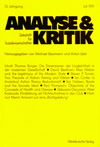Entscheidung durch Diskurs

1996 (18) Issue 2
Editorial
In jeder Gesellschaft müssen kollektive Entscheidungen gefällt werden, die nicht für alle Betroffenen in gleichem Maße Vorteile bringen und die Lasten auf sie nicht in gleicher Weise verteilen. Exemplarisch hierfür stehen Entscheidungen im Umweltbereich, bei denen etwa über den Standort einer Abfalldeponie befunden werden muß. Gemäß dem Ideal der Demokratie sollten es die Bürger selbst sein, die solche Entscheidungen fällen. Die Umsetzung dieses Ideals in die Praxis ist aber selten vo...
Table of Contents
Title: Der kooperative Diskurs: Grundkonzeption und Fallbeispiel
Author: Ortwin Renn / Thomas Webler
Page: 175-207
Abstract: Complex modern societies require new ways of political conflict solution, especially concerning environmental conflicts. We distinguish six forms of conflict solution, including those of mediated bargaining and cooperative discourse. If one opts for cooperative discourse, further orientation according to criteria such as fairness, competence, legitimation and efficiency seems to be important. Three procedural steps within cooperative discourse - i. e. establishing relevant value attitudes, expert-hearings, evaluation of options by citizen panels - are sketched and critically discussed, making use of experience from recent discoursive siting panels in Switzerland and Southern Germany. With the exception of a legitimatory deficiency (which may be improved) cooperative discourse and citizen participation in environmental decision-making turn out to be most promising.
Title: Licht und Schatten des Diskurses. Bemerkungen zur diskursiven Lösung von Konflikten
Author: Rudolf Schüßler
Page: 208-224
Abstract: As a consequence of the world's present ecological crisis, the potential for political protest has increased and a demand for technologies of conflict resolution has arisen. One method, favored by Ortwin Renn, applies the ethics of open discourse to negotiations between politicians, experts, and citizens. The ethical appeal of this method can easily lead to an undervaluation of its shortcomings and risks - a problem which I will try to help amend in this article. Above all, it has to be noticed that the participation in open discourse can tranquilize grass-root protests even in areas where the willingness to engage in a compromise might hurt the true public interest. And who should choose which technology of conflict resolution is applied? The citizens themselves and not just the experts of discourse should probably decide.
Title: Ein politisch-ökonomischer Blick auf Diskurse. Kooperativ beim Aperitif - mit Interessen zum Essen
Author: Reiner Eichenberger
Page: 225-244
Abstract: Cooperative discourse procedures produce consensual siting proposals for NIMBY-projects-but only if these proposals do not affect the final siting decision. Then, the members of the discourse commissions stay independent and face few incentives to pursue consequentialist interests. However, the more influential discourse procedures become, the stronger the interest groups, incentives are to take advantage of them. Thus, cooperative discourses turn into competitive, interest-centred procedures whose outcome is rejected by the less influential groups. The evolution, of discourse procedures into functionally specialized parliaments or even into FOCJ (Functional, Overlapping, Competing Jurisdictions) seems worth pursuing.
Title: Diskursverfahren: Liebe auch auf den zweiten Blick?
Author: Felix Oberholzer-Gee / Isabelle Vautravers-Busenhart / Armin Falk / Jürg de Spindler
Page: 245-264
Abstract: Discourse-based processes seek to arrive at socially acceptable decisions by adhering to a specific set of procedures. In this case study, we empirically test how successful the 'Cooperative Discourse' was in identifying a socially acceptable site for a solid-waste landfill in Switzerland. Our results indicate that even individuals living in the community designated as the prospective site think highly of the 'Cooperative Discourse', but they know close to nothing about this procedure. This ignorance is rational, because, under Swiss laws, the recommendations of the discourse are not legally binding and siting projects can easily be thwarted by town hall meetings. In this case, the 'Cooperative Discourse' may have reached a consensus proposal because this proposal is socially not very relevant.